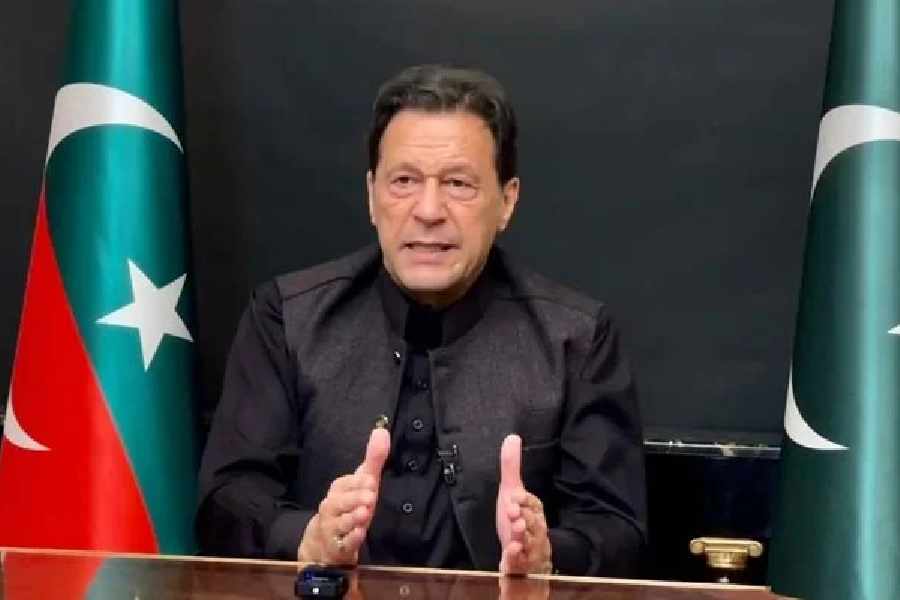Pakistan's Supreme Court on Friday dismissed Imran Khan’s plea against trial proceedings in a corruption case in which the former premier is accused of concealing details of the gifts he retained from the state repository, as he withdrew the case.
While dismissing the plea in the Toshakhana case, the apex court observed that the application seeking the transfer of the case to another court was underway in the Islamabad High Court (IHC). The court expressed the hope that the trial and the IHC will make decisions as per the law.
The Supreme Court observed that the said decision would not affect other pleas filed by Khan, 70.
Khan is accused of misusing his 2018 to 2022 premiership to buy and sell gifts in state possession that were received during visits abroad and worth more than Rs 140 million (USD 635,000).
On Wednesday, the apex court turned down Khan’s request to stay the trial in the Toshakhana case being heard at an Islamabad sessions court. However, it had also granted relief to the Pakistan Tehreek-e-Insaf chief by postponing further proceedings till Friday so that he could approach the court again in case any adverse order was passed by the Islamabad High Court (IHC).
Meanwhile, IHC on Thursday reserved its verdict on a set of petitions filed by Khan against the Toshakhana trial. It is expected to issue the said verdict on Friday. The IHC will also issue the reserved verdict on Khan’s appeal against the trial court’s order to refuse his right to produce witnesses in the case.
A three-member Supreme Court bench, led by Justice Yahya Afridi and comprising Justice Musarrat Hilali and Justice Mazahar Ali Akbar Naqvi, was set to hear Khan’s plea on Friday. However, the bench was reconstituted earlier today with Justice Hasan Azhar Rizvi replacing Justice Naqvi.
During the hearing, Advocate Khawaja Haris appeared as Khan’s counsel while Advocate Amjad Pervaiz appeared as the counsel for the Election Commission of Pakistan (ECP).
At the outset of the hearing, the apex court observed that the trial court could not reserve its verdict on the Toshakhana case until the IHC gave its verdict, the dawn newspaper reported.
Justice Afridi summoned the ECP lawyer to the rostrum, upon which Khan’s lawyer informed the court that the IHC had reserved its verdict yesterday on his client’s pleas.
The judge then asked, “Has the high court given a stay order?” to which Advocate Haris answered in the negative.
“The trial court cannot make a decision until a decision is made on the plea to transfer the case,” Justice Afridi noted.
At this, the ECP lawyer said Section 528 (sessions judge may withdraw cases from assistant sessions judge) of the Code of Criminal Procedure was “clear on this matter”.
Under the said section, “any sessions judge may withdraw any case from, or recall any ease which he has made over to, any assistant sessions judge subordinate to him”.
At one point during the hearing, Justice Afridi asked Advocate Haris about the current status of the pleas pending in the IHC, to which he responded that the IHC heard four pleas yesterday and that requests were also made during the arguments.
“We have requested the high court that the case be transferred to any other judge,” the PTI chief’s lawyer said.
He further informed the apex court of the IHC’s dismissal of Khan's witnesses in the Toshsakhana trial.
The ECP on October 21 last year, disqualified the former prime minister in the Toshakhana case for making "false statements and incorrect declaration".
Khan is facing more than 140 cases across the country and faces charges like terrorism, violence, blasphemy, corruption and murder.
Khan was ousted from power in April last year after losing a no-confidence vote, which he alleged was part of a US-led conspiracy targeting him because of his independent foreign policy decisions on Russia, China and Afghanistan.
Except for the headline, this story has not been edited by The Telegraph Online staff and has been published from a syndicated feed.











